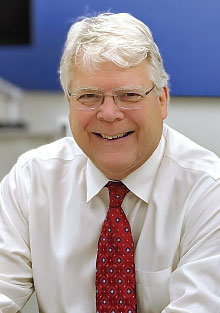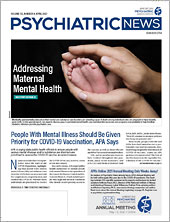Psychiatrists and other health care leaders—and the hospitals and health systems where they work—need to create a “culture of wellness” and an organizational structure that supports the wellness of physicians and other health care workers.
That includes education about self-care and timely access to treatment for depression and burnout, according to the APA Committee on Disaster Psychiatry. The committee has released a guidance document titled “Actions and Activities That a Healthcare Organization Can Take to Support Its Physician Workforce Well-Being During COVID-19 and Beyond.”
The guidance document includes information about self-care but focuses especially on organizational factors that contribute to burnout and mental illness among health care workers.
“If you look at the burnout literature, 80% of the causes are organizational,” said Peter Yellowlees, M.B.B.S., M.D., chief wellness officer at UC-Davis and lead author of the document. “What we do in this document is take core mainstream ideas used in the arena of wellness and apply them to COVID-19 by looking at them through the lens of disaster.”
Yellowlees said many of the strategies for dealing with the stresses of COVID-19 are drawn from the military, which has decades of experience dealing with acute and chronic situations of life-threatening emergencies.
Importantly, the document calls for health systems to update an organizational structure that supports wellness and encourages those systems to do the following:
•
Develop, fund, and support a chief wellness officer team with physician wellness champions in all departments and major divisions.
•
Ensure that physicians are trained in leadership and entrusted to leadership positions throughout the organization so that physicians’ voices are heard and influential and that clinical team functioning is improved generally, thereby diminishing the psychological distress of all team members.
•
Develop a “critical mass” of physicians who are interested in and committed to clinician well-being and who may have sought additional training through a number of programs.
The guidance also emphasizes the importance of a “buddy system,” long used by the military to build and sustain teamwork in the face of life-threatening situations. Additionally, hospitals and health care systems should provide “timely, easy, nonstigmatized access to emotional support and mental health care for all physicians” (see box).
In comments to Psychiatric News, Yellowlees emphasized that wellness is an area to which psychiatrists bring special expertise and can be leaders.
The guidance states that “by the nature of their professional roles, expertise, and training, psychiatrists are perfectly positioned to be key contributors to these solutions.” Psychiatrists should work with all levels of organizational leadership and embrace the following activities:
•
Taking leadership roles within the organization, such as chief wellness officer, chair, or member of the Well-Being Committee or departmental well-being champion.
•
Taking a specific clinical interest in assessing and treating physicians and their families.
•
Educating colleagues about mental disorders, the continuum of symptoms of stress and distress, and the principles of psychological first aid.
•
Leading resilience and self-care activities.
Joshua Morganstein, M.D., chair of the APA Committee on Disaster Psychiatry, said the COVID-19 pandemic is a “unique, extreme, prolonged disaster that has created extreme stressors for physicians and other health care workers and the systems in which they work.”
He is assistant director of the Center for the Study of Traumatic Stress and assistant chair of the Department of Psychiatry at the Uniformed Services University in Bethesda, Md.
“Bringing the pandemic to an end requires sustainment of the health care workforce through actions that mitigate stress, promote resilience, and enhance performance,” Morganstein told Psychiatric News. “This guidance document provides actionable, evidence-informed recommendations and resources for leaders and supervisors to enhance sustainment of physicians during COVID-19, which is critical to national and global health security.” ■

